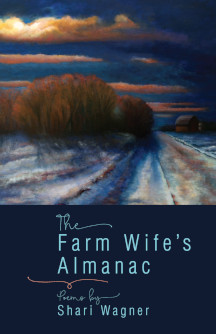|
 |
||||||||
|
|
Cascadia home | ||||||||
Summary (also available by PDF flier): As she contends with forces that threaten to uproot what she loves, the farm wife emerges as a prophetic voice from America's heartland, embracing a concept of community that includes the dead and the living, neighbors and strangers, cultivated fields and ditches thick with milkweed. This is exemplified in "The Writer's Almanac" reading of the poem "The farm wife turn's off the TV evangelist." Through the poems in The Farm Wife’s Almanac, we are privy to the bittersweet story of a Mennonite woman beset by forces that threaten her farm and rural community. With candor and wit, she defends handkerchiefs, clotheslines, unlocked doors, and unmown ditches. She steps outside to predict the weather, avoids restaurants with booths “so tall, you can’t see your neighbors,” and denounces a corporate hog farm that would expand production of “boxed-up piglets” by razing her barn and despoiling a creek. Reviewing in Mennonite Quarterly Review, Abigail Carl-Klassen says that "Wagner’s collection is unique in using its organizational structure and traditional forms in ways that are liturgical and meditative to embrace and subvert the lived and imagined experiences of women on the farm, in all its forms, past, present, and future.” “These poems are treasures unpacked and gleaming with quiet passion, humor, and wisdom. Wagner gently lifts the life of a farm wife into view, then dazzles the reader with insights that surprise and enlarge, drawing us into the history of both restriction and wonder, so that we too can imagine 'releasing the parachutes of milkweed' for the return of 'whirling monarchs so thick they block the sun.'” —Jean Janzen, Author, What the Body Knows “The farm wife names children after beloved cows, plays rook, and wants to be buried in a root cellar. In poem after poem we see what might appear to be a sheltered, insular life in its true and astonishing expansiveness. These are poems of both intensity and calm beauty, transformative in their vision of the holiness in the everyday.”— Jill PelŠez Baumgaertner, Author, What Cannot Be Fixed and Poetry Editor, The Christian Century “’Iva’s
tongue was honey-sweet and stung like a bee,’ the poet writes, an apt
description of Wagner’s own poetic gifts, on full display in The Farm Wife’s Almanac.
Rich in pathos and humor, this is a collection that embodies the
culture from which it was birthed, a true celebration of living close
to the land. As one of Wagner’s farm wives says, ‘I’d shun the plain,
gray stones in Yoder Cemetery. Bury me in a root cellar, I’d say, with
garlands of garlic and chili peppers, among gems of peach and plum and
cherry.’ And those bright canning jars, the soil’s rich aroma, the
fruit of the land captured and hidden in the dark of the cellar, mark
Wagner’s own particular vision, making this an almanac full of wisdom,
forecasting a part of the agrarian world that is too quickly
disappearing.” —Todd
Davis, Author, Native Species and Winterkill Quote:
One of the closing farm wife poems, “The farm wife reviews the Tornado
Theater at Menno-Hof Museum,” reports that “In the rubble of Eli
Yoder’s house /all they found intact was a glass jug / with a carving
stuck inside: ‘Fear God’ / on one side— ‘God Is Love’ on the
other. / Eli took that as a sign of the Almighty’s power, /
but I
believe whirling wind spins the bottle / and God is in the
dark
with us, / not writing down what happens next.” Shelving: Poetry; Anabaptist-Mennonite literature. BISAC: Poetry; RTM: 640 Poetry Publisher: Cascadia
Publishing House LLC |
|||||||||
|
|
|||||||||




